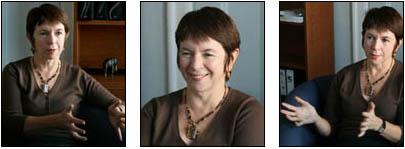Entre Nous
with Wendy Thomson, Director of the School of Social Work

Thomson has set clear goals to make the program more viable, teaching everything from conducting frontlines work to understanding policy.
OWEN EGAN
Research driven by reality
A little over a year ago, Wendy Thomson made a pretty serious career change. The former chief advisor to British Prime Minister Tony Blair on public service reform, Thomson made a name for herself by spearheading the efforts to modernize some of Britain's oldest and creakiest public services — including higher education. Since last September, Thomson has been Director of the School of Social Work where her efforts to modernize continue, albeit on a somewhat different scale.
One year after taking the reins, how are things going?
It's been a really full year for both me and the school. Personally, it was a big change to come back to a school where I hadn't been since the 1970s. A lot of my time has been spent learning how McGill works.
At the school, we initiated a strategic planning process with the help of our various program heads. This planning group sat down to determine what are the main issues facing the school and agree on a set priorities.
So what are some of those priorities?
Our first priority is to make the program more viable. Because we've lost a lot of staff over the past eight or nine years, we need to go out and hire people. Three new staff members started in September and we're looking to hire more, including a CRC. Through the compact process, we were delighted to receive some funds to help us get more sessional lecturers — people who aren't tenure track professors, but who have a wealth of experience as social workers.
We're also making big changes to our Bachelor of Social Work (BSW) program. Primarily, we're trying to ensure that our Bachelors, Masters and PhD programs are more of a set, so that one is clearly offering something different than the others. To make our BSW a more generalist program, we've developed a more consistent set of required courses. For example, everyone will be required to do individual and family work as well as community work. They will also have to have some understanding of policy.
More controversially, we're changing the Special BSW program. In the past, it lasted 14 months, from summer to summer. Although it will be the same four semester program, it will span over two years so that it is aligned with the fall and winter semesters. It will take a little longer, but people won't be quite as breathless at the end of it all.
I thought I detected the smell of fresh paint in the air? Is Wilson Hall getting a facelift?
I've seen graffiti in the bathroom that was there when I was an undergrad [laughing]. We secured some money from university to for a much-needed redecoration. My view is if we're working to educate professionals to work in modern social services, we should model that. The days in which poor people received services in poor premises are over.
How does the school fit into the vast McGill framework?
In order to be relevant as a professional school, we need to be connected to the outside world. I think we are pretty unique in the way we make research connect with reality and for doing research that is driven by reality. As stated in the White Paper, McGill wants to pursue its interest in public and social policy. Our school is a direct way of having an immediate impact on the outside school.
A native Montrealer, you were in England for 25 years. What's the best thing about coming home?
I have to say, without this being a shameless plug, the McGill Daycare is really great. My five-year-old daughter started there this September and we both think it's absolutely wonderful.
Search
Search (skip):
Wendy Thomson's first job:
Sort of this, sort of that I had a few part time but my first real job was working at the Head and Hands community centre in N.D.G. It was in the 1970s, I was 20 and they were pretty heady days. I started as sort of a street worker and eventually became sort of a social worker while I was studying at McGill. Eventually I became sort of the director, so my tendency to take on managerial roles was present pretty early on.

